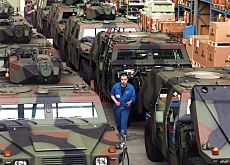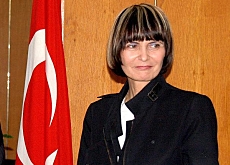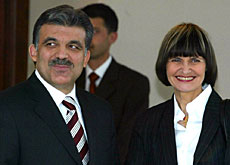Tensions resurface in Swiss-Turkey relations

Turkey has criticised a decision by canton Zurich's justice authorities to investigate a Turkish historian for allegedly denying the 1915 Armenian massacre.
The move comes shortly after relations between the two countries – which had been dogged by the Armenian question – appeared to have stabilised.
The row centres on comments made a year ago by Yusuf Halacoglu, the president of the Turkish History Organisation, in Winterthur in canton Zurich.
During the talk, given at the invitation of the Turkish community, the prominent historian is said to have denied that the killings of hundreds of thousands of Armenians was genocide.
Armenians say around 1.8 million people were killed. Turkey disputes this, putting the figure closer to 200,000.
Winterthur’s investigating magistrate is now reported to be looking into claims that Halacoglu could have broken Swiss anti-racism legislation.
Condemnation
Turkish Foreign Minister Abdullah Gül told Turkey’s Hürriyet newspaper on Monday that the decision by canton Zurich and some European parliaments to “forbid the rejection of the Armenian genocide” was a “terrible mistake”.
Gül added that Zurich’s investigation was also against the European Agreement on Human Rights and that Europe was “trampling on its own foundations” by stopping the freedom of expression.
The Turkish foreign ministry said on Monday that it had summoned the Swiss ambassador to Turkey, Walter Gyger, to explain the move. The Turkish embassy in the Swiss capital, Bern, has also protested to the Swiss government.
It added, however, that Bern and Ankara were “closely collaborating” and that Switzerland had been cooperative.
But a spokesman for the Swiss justice ministry denied that a warrant had been issued for Halacoglu’s arrest via Interpol, as was reported in some Turkish media.
Winterthur’s prosecuting magistrate Andrej Gnehm also said on Monday that he had asked Interpol to provide him with some information about the historian.
He added that he would like to interview Halacoglu, which could also take the form of written replies, to decide whether to go further with the investigation – still at its early stages.
Tensions
The row comes at a time when relations between the two countries appeared to be calming down after a period marked by tensions over the Armenian question.
First canton Vaud’s parliament voted to recognise the Armenian genocide, which led Ankara to withdraw an invitation to Swiss Foreign Minister Micheline Calmy-Rey to visit Turkey in September 2003.
A similar vote on the Armenian matter by the House of Representatives three months later drew fresh condemnation from Turkey.
Calmy-Rey finally made the trip to Ankara at the end of March this year, which resulted in the two countries agreeing to disagree over the Armenian issue.
And last month the way was cleared for Switzerland to begin selling arms to Turkey for the first time since 1992 when it introduced tight restrictions on exports to the country.
The Turkish government ended it embargo on Swiss arms on April 28, one month after Switzerland lifted its boycott.
swissinfo with agencies
Armenians say 1.8 million of their people were killed or deported from 1915-18 by the Ottoman Empire.
Turkey disputes this, putting the figure closer to 200,000.
The treaty marking the birth of modern Turkey was signed in Lausanne on July 24, 1923.

In compliance with the JTI standards
More: SWI swissinfo.ch certified by the Journalism Trust Initiative



You can find an overview of ongoing debates with our journalists here. Please join us!
If you want to start a conversation about a topic raised in this article or want to report factual errors, email us at english@swissinfo.ch.